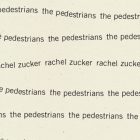Pew by Catherine Lacey

Pew
Catherine Lacey
Farrar, Straus and Giroux | July 21, 2020
No one can quite say who Pew is, least of all Pew. In Catherine Lacey’s latest novel, Pew wakes up on their namesake in a church in an unnamed Southern town, and presents the residents with a conundrum: is Pew white? Black? Man? Woman? Neither? Both? No one agrees, but everyone has an opinion—except, of course, Pew. Is a narrator unreliable when they honestly don’t know themselves? The situation is not quite like Toni Morrison’s Paradise, where the narration consciously elides characters’ race—Lacey’s characters acknowledge race and posit theories on Pew’s—but the effect is similar: readers make assumptions and must consequently reckon with their own reading.
Pew thinks, “Anything I remember being told about my body contradicts something else I’ve been told.” The character is not simply a blank slate or unfeeling cipher for the audience or the author. Pew’s narration reads like someone in constant dissociation—at once outside their own body, and all-too-aware of it. This body, undefinable, is a temporary shield, allowing the more generous townsfolk to welcome Pew in, if only for a time. The body’s unfamiliarity eventually invites confusion, frustration, and rejection. Pew’s refusal to self-identify gets them shuffled between houses and families like a shameful secret, a bad priest between parishes. Late in the novel, a woman calls Pew “our new Jesus,” a suspicion that lurks unsaid in many townsfolk, and likely readers’ minds. If this is divinity, though, it looks more like a curse. Jesus didn’t get the happiest ending, either.
Lacey is noncommittal on whether or not Pew should be read as divine or not and makes meta moves such as this observation from one of Pew’s many confessors. “When someone says they heard something you did not hear, and they know you did not hear it, then you cannot tell them they did not hear what they believe they heard. They heard their desire to hear something, and desire always speaks the loudest. It is the loudest and most confusing emotion—wanting.” Truth is ever-slippery, but what one person believes is the truth can be very telling.
The novel’s mystery is less about Pew’s identity and more about how people react to it. Pew doesn’t talk much, uttering aloud maybe thirty words in the novel, most of which are, “I don’t know.” Forced to fill the silence, characters speak uninterrupted monologues to Pew, to the point where a more fitting name for the narrator might be “Confessional.” A Tori Amos line comes to mind, “Yes I know what you think of me, you never shut up.” Pew—ultimately identity-less—leaves readers to learn more about the town’s inhabitants and find familiarity in people they might rather not. Everyone in town, it seems, has a secret. An old woman tells Pew that her husband confessed on his deathbed to lynching a black man. Later on, Pew meets this supposedly late-husband, who is very much alive, and who everyone knows stabbed his wife in the eye. Is everyone then lying to her that he’s dead? Or is she lying to herself? To Pew?
Open secrets should come as no surprise in a novel that begins with an epigraph from Ursula Le Guin’s “The Ones Who Walk Away From Omelas.” The passage from the classic short story, in which a perfect society is predicated on the constant unspoken abuse of a single child, marks the first note of utter dread that builds the novel’s funeral dirge. What on earth is this town going to do to Pew? Everyone mentions the upcoming Forgiveness Festival at the end of the week, and please Pew won’t you come along and see it? Without giving away Lacey’s last tricks, the cacophonous climax harmonizes with Le Guin’s story. Another contemporary voice that complicates Le Guin’s work comes from N.K. Jemisin’s version of Omelas, “The Ones Who Stay And Fight.” Another character remarks to Pew, “People need a sense of righteousness to take things from others . . . to carry out violence. Divinity gives them that. It creates the reins for cruelty.” What are people willing to do to protect their perceptions of peace? The answers may not be surprising, but when history is an endless horror show, why should we expect any different? The townsfolk mistake Pew’s silence for a lack of judgment, for forgiveness. But what good is grace when people give it to themselves?



